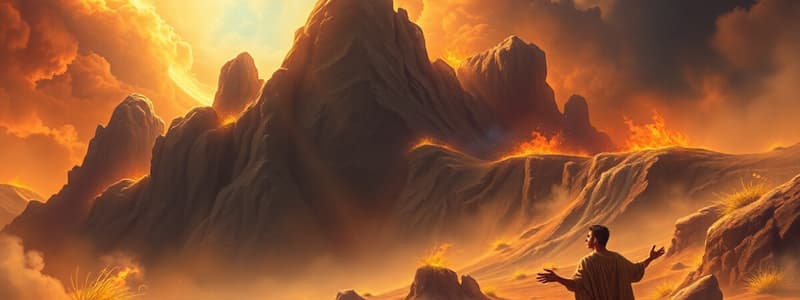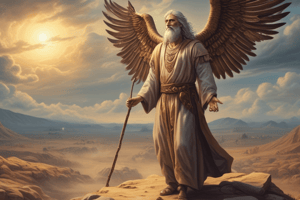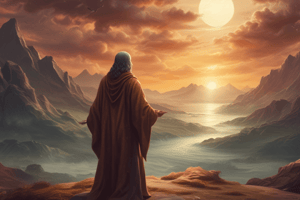Podcast
Questions and Answers
What does the term 'prophet' primarily refer to?
What does the term 'prophet' primarily refer to?
- A religious leader
- A person who predicts the future
- An inspired person sent by a deity (correct)
- A writer of historical texts
The Minor Prophets are considered less important than the Major Prophets.
The Minor Prophets are considered less important than the Major Prophets.
False (B)
Name one of the literary prophets from the Neo-Babylonian era.
Name one of the literary prophets from the Neo-Babylonian era.
Jeremiah
The Hebrew Bible's section on Prophets is referred to as __________.
The Hebrew Bible's section on Prophets is referred to as __________.
Which of the following is NOT a primary ingredient of the prophets' messages?
Which of the following is NOT a primary ingredient of the prophets' messages?
The organization of prophets into Major and Minor is based on their thematic importance.
The organization of prophets into Major and Minor is based on their thematic importance.
What did pre-exilic prophets warn about?
What did pre-exilic prophets warn about?
Match the following groups of prophets with their historical phases:
Match the following groups of prophets with their historical phases:
Which deity is known as the patron of magic spells in Babylon?
Which deity is known as the patron of magic spells in Babylon?
Magic was only believed to have negative effects in ancient societies.
Magic was only believed to have negative effects in ancient societies.
What method did ancient Egyptians use to gain insights or predictions?
What method did ancient Egyptians use to gain insights or predictions?
The Hebrew word for prophet, '_______', is believed to have connections outside of Israel.
The Hebrew word for prophet, '_______', is believed to have connections outside of Israel.
Match the following ancient cultures with their associated prophetic practices:
Match the following ancient cultures with their associated prophetic practices:
What was the primary function of magicians in ancient society?
What was the primary function of magicians in ancient society?
The ecstatic prophets of Baal are considered to be products of Hebrew culture.
The ecstatic prophets of Baal are considered to be products of Hebrew culture.
How did the prophetic movement in Israel arise according to T.J. Meek?
How did the prophetic movement in Israel arise according to T.J. Meek?
The root of the term for prophecy is believed to trace back to _____.
The root of the term for prophecy is believed to trace back to _____.
Match the prophetic figures or practices to their respective cultures:
Match the prophetic figures or practices to their respective cultures:
What was a common theme among prophetic messages in ancient Egypt?
What was a common theme among prophetic messages in ancient Egypt?
The Bible shows that prophecy was limited only to Israel.
The Bible shows that prophecy was limited only to Israel.
Which group did the Hebrew prophets contrast with in terms of moral and ethical conduct?
Which group did the Hebrew prophets contrast with in terms of moral and ethical conduct?
Prophets in biblical times were often expected to fulfill divine ______.
Prophets in biblical times were often expected to fulfill divine ______.
Who among the following believed that the root of prophecy can be traced to Arabia?
Who among the following believed that the root of prophecy can be traced to Arabia?
What does the term 'nabi' refer to in the context of prophets?
What does the term 'nabi' refer to in the context of prophets?
All forms of divination rely solely on natural events.
All forms of divination rely solely on natural events.
What is the primary role of an envoy or ambassador in the context of prophets?
What is the primary role of an envoy or ambassador in the context of prophets?
In religious contexts, ________ is the attempt to explain what has happened and what may happen.
In religious contexts, ________ is the attempt to explain what has happened and what may happen.
Match the terms with their meanings:
Match the terms with their meanings:
What does the term 'Hozeh' primarily relate to?
What does the term 'Hozeh' primarily relate to?
Israelite religion and surrounding nations' religions were fundamentally similar in their practices.
Israelite religion and surrounding nations' religions were fundamentally similar in their practices.
What did God promise Israel in His revelation?
What did God promise Israel in His revelation?
The act of communication from God is referred to as ________.
The act of communication from God is referred to as ________.
Match the term with its definition:
Match the term with its definition:
What is one common goal of the surrounding nations that engaged in religious practices?
What is one common goal of the surrounding nations that engaged in religious practices?
Divination and magic are entirely dissimilar without overlapping principles.
Divination and magic are entirely dissimilar without overlapping principles.
What is the significance of the prophet's power to enlighten?
What is the significance of the prophet's power to enlighten?
________ is a way of attempting to control destiny through specialized knowledge.
________ is a way of attempting to control destiny through specialized knowledge.
Which term emphasizes the moral character and divine authority of prophets in Israel?
Which term emphasizes the moral character and divine authority of prophets in Israel?
Israel's unique claim to divine revelation was meant solely for their prosperity.
Israel's unique claim to divine revelation was meant solely for their prosperity.
What is referred to as the 'prophetical condition' in ancient context?
What is referred to as the 'prophetical condition' in ancient context?
The prophet Balaam is mentioned as a Mesopotamian prophet in the Bible.
The prophet Balaam is mentioned as a Mesopotamian prophet in the Bible.
Who was the priest-scribe that delivered a prophecy of chaos to Pharaoh Snefru?
Who was the priest-scribe that delivered a prophecy of chaos to Pharaoh Snefru?
The two key words for prophet in Mari are muḫḫum and __________.
The two key words for prophet in Mari are muḫḫum and __________.
Match the ancient prophets with their characteristics:
Match the ancient prophets with their characteristics:
Which goddess was associated with Neferti?
Which goddess was associated with Neferti?
Inspired prophecy in Mari is believed to have originated over 1,000 years before certain Israelite prophets.
Inspired prophecy in Mari is believed to have originated over 1,000 years before certain Israelite prophets.
What is the primary message of the Mari prophets concerning the king's responsibility?
What is the primary message of the Mari prophets concerning the king's responsibility?
The Iranian prophet commonly associated with Zoroastrianism is __________.
The Iranian prophet commonly associated with Zoroastrianism is __________.
Match the divine figures with their roles in inspiring kings:
Match the divine figures with their roles in inspiring kings:
What type of prophecies were highlighted among the Mari prophets?
What type of prophecies were highlighted among the Mari prophets?
The divinatory priest known as baru could perform his role without any required training.
The divinatory priest known as baru could perform his role without any required training.
What revelation did Zarathustra claim to have received?
What revelation did Zarathustra claim to have received?
The priest associated with the practice of astrology and divination in ancient times is known as __________.
The priest associated with the practice of astrology and divination in ancient times is known as __________.
Match the described prophet with their type:
Match the described prophet with their type:
What did some texts from the ancient Middle East reveal about prophecy?
What did some texts from the ancient Middle East reveal about prophecy?
Flashcards
Prophecy
Prophecy
A message from a deity, often delivered by an inspired person (prophet).
Prophet
Prophet
An inspired person believed to be sent by a deity to deliver a message.
Former Prophets
Former Prophets
Books of the Hebrew Bible (Old Testament) detailing historical events, including the reigns of kings.
Latter Prophets
Latter Prophets
Signup and view all the flashcards
Major Prophets
Major Prophets
Signup and view all the flashcards
Minor Prophets
Minor Prophets
Signup and view all the flashcards
Pre-exilic Prophets
Pre-exilic Prophets
Signup and view all the flashcards
Exilic Prophets
Exilic Prophets
Signup and view all the flashcards
Post-exilic Prophets
Post-exilic Prophets
Signup and view all the flashcards
Neo-Assyrian Period
Neo-Assyrian Period
Signup and view all the flashcards
Neo-Babylonian Period
Neo-Babylonian Period
Signup and view all the flashcards
Persian Period
Persian Period
Signup and view all the flashcards
Prophets
Prophets
Signup and view all the flashcards
Prophecy
Prophecy
Signup and view all the flashcards
Nabi (Hebrew)
Nabi (Hebrew)
Signup and view all the flashcards
Nabu (Akkadian)
Nabu (Akkadian)
Signup and view all the flashcards
Hozeh (Hebrew)
Hozeh (Hebrew)
Signup and view all the flashcards
Roeh (Hebrew)
Roeh (Hebrew)
Signup and view all the flashcards
Ish Elohim (Hebrew)
Ish Elohim (Hebrew)
Signup and view all the flashcards
Divine Revelation
Divine Revelation
Signup and view all the flashcards
Religion (in contrast to revelation)
Religion (in contrast to revelation)
Signup and view all the flashcards
Divination
Divination
Signup and view all the flashcards
Magic
Magic
Signup and view all the flashcards
Ancient Magic
Ancient Magic
Signup and view all the flashcards
Babylonian Creation Story
Babylonian Creation Story
Signup and view all the flashcards
Egyptian Magic Manuals
Egyptian Magic Manuals
Signup and view all the flashcards
Ancient West Asian Prophecy
Ancient West Asian Prophecy
Signup and view all the flashcards
Hebrew Prophets vs. Others
Hebrew Prophets vs. Others
Signup and view all the flashcards
Prophecy in Ancient Egypt
Prophecy in Ancient Egypt
Signup and view all the flashcards
Divination in Ancient Mesopotamia
Divination in Ancient Mesopotamia
Signup and view all the flashcards
Prophecy's Cultural Influence
Prophecy's Cultural Influence
Signup and view all the flashcards
Prophecy as Political Tool
Prophecy as Political Tool
Signup and view all the flashcards
Prophetical Condition
Prophetical Condition
Signup and view all the flashcards
Mari Prophets
Mari Prophets
Signup and view all the flashcards
Mukhḫum
Mukhḫum
Signup and view all the flashcards
Āpilum
Āpilum
Signup and view all the flashcards
Baru
Baru
Signup and view all the flashcards
Zarathustra
Zarathustra
Signup and view all the flashcards
Omina
Omina
Signup and view all the flashcards
Maḫḫu
Maḫḫu
Signup and view all the flashcards
Balaam
Balaam
Signup and view all the flashcards
Study Notes
Old Testament Prophecy
- Prophecy and the prophetic movement are central to the Old Testament, particularly during times of crisis for Israel.
- The concept of prophecy transcends Judaism and Christianity, appearing in various ancient and modern religions.
- A prophet, in the narrow sense, is an inspired individual claiming divine communication.
- A broader definition encompasses anyone expressing a deity's will.
- Divine will is often ascertained through visions, dreams, or ritualistic methods.
- The Hebrew Bible's Prophets (Nebiim) are divided into Former and Latter Prophets.
- Former Prophets: Joshua, Judges, 1 Samuel, 2 Samuel, 1 Kings, and 2 Kings.
- Latter Prophets are identified by their named scrolls.
- Major and Minor Prophets differ only in the length of their recorded oracles.
Historical Context of Prophets
- The literary prophets illuminate Israel's history from 8th to 5th centuries BCE.
- Prophecy's roots lie within Israel and the ancient Near East.
- Prophets are categorized by the historical periods they addressed:
- Neo-Assyrian period (Amos, Hosea, Micah, Isaiah)
- Neo-Babylonian era (Zephaniah, Jeremiah, Habakkuk, Nahum, Ezekiel, Obadiah)
- Persian period (Daniel, Haggai, Zechariah, Joel, Malachi)
- Pre-exilic prophets warned of judgment.
- Exilic prophets offered hope of restoration.
- Post-exilic prophets addressed the restored community.
- Common prophetic themes include judgment for sin, description of sin and judgment, calls for repentance, and promises of future deliverance.
Defining Prophets and Revelation
- Prophets are divine envoys with a direct relationship to God's word.
- They are charismatic figures gifted with receiving and delivering divine messages.
- Prophets are more than predictors; they are also emotional preachers and social activists.
- Prophecy is an act of communication, conveying insights and leading cults.
- The Hebrew term "nabi" is related to "called one."
- This term is also related to "to proclaim" or "to announce" in Arabic, and "to boil," "to flow," or "to bubble forth" in Hebrew.
- Other related terms include "hozeh" (visionary/seer), "roeh" (seer), and "ish elohim" (man of God), each with nuances in meaning and emphasis.
Religion vs. Revelation
- Israel's claim to divine revelation was distinctive.
- God's revelation involved guiding and promising prosperity to Israel.
- Israel was expected to show faith and submit to instructions for prosperity.
- Deviation from revelation, even slightly, turns revelation into religion.
Religion and Divination/Magic
- Religions in neighboring societies sought divine guidance.
- Humans employed professional diviners, magicians, and interpreters of dreams.
- Religion aimed to understand, explain, and control destiny through rituals, omens, and magical practices.
- Divination used objects or events to predict the future.
- Magic was a crucial part of the ancient Near East, aiming to influence the supernatural and human affairs. Magic affected all aspects of life.
- Divination and magic were ways humans sought to understand and interact with their destiny.
Prophecy in the Ancient Near East
- Scholars suggest Israelite prophecy developed from West Asian (particularly Canaanite) influences.
- Different scholars have offered various theories.
- Different theories cite various regions, people groups and historical events to support various origins.
- Israelite prophecy differed from heathen divination, displaying moral excellence and accuracy.
- The Old Testament acknowledges that prophecy existed outside of Israel.
- Examples of prophecy in other cultures are also highlighted in the text (e.g., Moab, Northern Syria, Egypt, Hittites, Mari).
- These examples show that inspired communication, including pronouncements resembling prophecy, existed in ancient Near Eastern societies.
- The text emphasizes that while analogous prophetic figures exist in other cultures, the Hebrew prophets' connection to personal calls, moral authority, and accurate predictions distinguished them.
Zoroaster (Zarathustra)
- Zarathustra, an ancient Iranian prophet, founded Zoroastrianism, a religion focused on the god Ahura Mazda (Ormazd) whose teachings are outlined in the Avesta.
- Some believe Zarathustra was an ecstatic priest-singer who used techniques to receive trance-like visions.
- His prophecies address the end of the world.
Studying That Suits You
Use AI to generate personalized quizzes and flashcards to suit your learning preferences.




